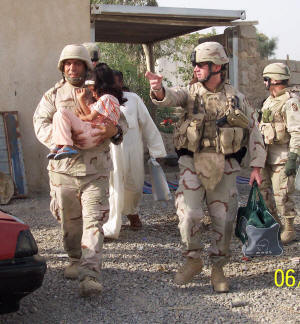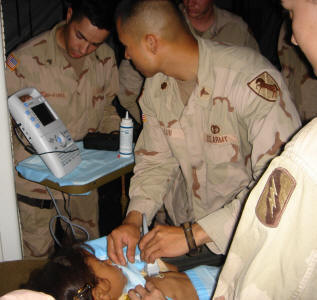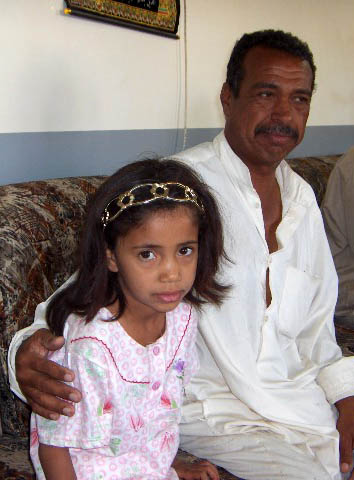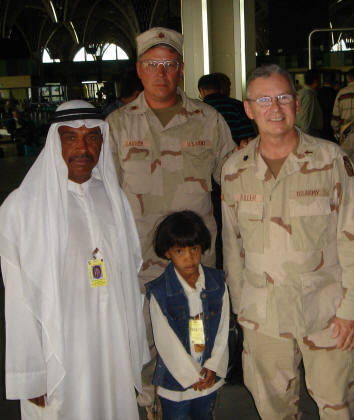|
Iraqi Girl’s Future Getting Brighter
 |
| Soldiers of the 155th
Brigade Combat Team carry Hadiya Hussein to their vehicle in order
to get her to Forward Operating Base Kalsu, Iraq, for a medical
examination prior to her leaving for the United States for life
saving heart surgery. |
FORWARD OPERATING BASE KALSU, Iraq,
October 15, 2005
With a tear in her eye and a smile on her face, Hadiya Hussein and her
father began their journey to the United States. In a war where death
and destruction are often the main themes seen on the home front, this
is a story about life.
Specifically, it is a story about the life of a six-year-old Iraqi
girl that had little hope of a real future. She was born with a hole
between the bottom two chambers of her heart that prevents oxygenated
blood from getting throughout her small, frail body. This limits her
in normal daily children’s activities. In other words, the other
children are able to run, romp and play, while Hadiya has to stand
back and merely watch.
Soldiers with the 155th Brigade Combat Team (BCT) learned about her
condition while conducting a routine inspection of the water treatment
plant in the village of Tunis, Iraq. The 155th BCT is an Army National
Guard unit comprised of soldiers from Mississippi, Arkansas,
California, Vermont, and various other states.
"Much effort is being put into Iraq’s medical infrastructure." says
1st Lt. Brent Lindley, medical planner for the 155th BCT, from
Hattiesburg, Miss. "Even though an Iraqi Heart Surgeon in Baghdad
could perform the surgery, the lack of after care put Hadiya’s chance
of survival at about 40 percent if she had it performed in Iraq." If
the surgery is performed in the United States by American doctors, he
said, her chances of survival, and even living a full life, are
greatly increased. Lindley added that without the surgery, there is no
way she will be able to survive.
Dr. John L. Meyers, professor of surgery and pediatrics, and chief of
cardiothoracic surgery at Penn State Children’s Hospital in Hershey,
Penn., has reviewed Hadiya’s medical files and has agreed to perform
the life saving operation at no cost to the family. In a letter sent
to the American Consulate in Iraq Meyers states, "We have accepted
Hadiya Hussein for treatment at the Milton S. Hershey Medical Center
Children’s Hospital to correct the abnormality of the ‘Ventricular
Septal Defect’. This treatment is not available in Iraq, and will not
require the use of [United States] taxpayer revenues."
It is expected that Hadiya will need approximately seven to ten days
of inpatient treatment. She should be in the United States
approximately three months, after which she will return to Iraq. The
estimated cost of the surgery and after care is approximately $20,000,
which will be paid for through the hospital’s Children’s International
Healthcare Fund. A family that wishes to remain anonymous is paying to
fly the little girl and her father to the United States and back to
Baghdad.
 |
| Hadiya Hussein is
examined at the battalion aid station located at Forward Operating
Base Kalsu, Iraq, before she leaves for the United States to
receive life saving heart saving surgery. |
Flying an Iraqi child and a parent to the United States involves the
U.S. Department of State issuing a non-immigrant visa. This visa
cannot be issued at the U.S. Embassy in Baghdad but is issued in
another country. The 155th BCT Chaplain, Lt. Col. Tommy W. Fuller, of
Florence, Miss., had been working with Hadiya’s father to obtain this
visa through the U.S. Embassy in Amman, Jordan. "They are the future
of Iraq and no greater way can we as American Soldiers and the
American people show this than by helping a family like Hadiya’s." he
said.
"These are very poor yet honorable people who work hard to earn a
living just to feed their children. By no means do they have, or could
they afford, this type of procedure." Major Bradley Lauver, of
Pittsburg, Penn., with the 490th Civil Affairs Battalion said. "The
father has pleaded with us to try and save Hadiya’s life. I have lost
a child myself, and I know the pain and suffering that one endures,
especially as a family trying to cope with the loss of a child." He
continued by adding, "I cannot sit back and let this course of action
happen without trying everything possible within my means to try to
save her life."
While Hadiya and her father are in the United States, private families
have volunteered to use their homes and personal resources to provide
daily care needs, which include providing food, lodging, and
transportation. This is done for the simple reason that the families,
who graciously open their doors, want to help.
In the early morning hours of October 8, 2005, a patrol left Forward
Operating Base (FOB) Kalsu, en route to Tunis, Iraq. Hadiya and her
father, Mohammed, were picked up and brought back to FOB Kalsu. Two
Army Blackhawk helicopters flew Hadiya and her father to Baghdad,
escorted by Lauver.
An hour later, Lt. Col. Fuller, 1st Lt. Lindley and 2nd Lt. Mark
Batiste, a platoon leader in Bravo Battery, 2nd Battalion, 114 Field
Artillery, left FOB Kalsu en route to Baghdad on "Highway 1" with
Bravo Battery, 2nd Battalion, 114th Field Artillery providing combat
patrol security.
Sunday morning, the group "saddled up" and escorted Hadiya and her
father to Baghdad International Airport. Hadiya and her father flew
from Baghdad, Iraq, to Amman, Jordan. At the U.S. Embassy in Jordan,
Hadiya and her father will completed their medical visas to travel to
the United States for Hadia’s heart surgery.
The cardiothoracic surgery team at Penn State in Hershey, Penn., is
awaiting Hadiya’s arrival. Though more tests will be needed prior to
surgery, many of the preoperative tests were done at the battalion aid
station by Lt. Col. Mike Brown, an Army thoracic surgeon assigned to
FOB Kalsu.
Lauver’s wife will meet Hadiya and Mohammed at an airport in the
United States and will assist them throughout their time in America.
Recovery is expected to take about two months. Hadiya and her father
will return to Iraq at this time.
"If we can make an impact on these children, we help the future of
Iraq." Lauver said.
By Sergeant 1st Class Kevin W. Reeves, 155th Brigade Combat Team,
public affairs NCO
ADDITIONAL PHOTOS:
 |
Hadiya Hussein and her father, Mohammed, sit together in their
home as Soldiers with the 155th Brigade Combat Team discuss
getting them to the United States for her life saving heart
surgery. |
 |
Little Hadiya Hussein (c) is surrounded by the ones she loves at
the Baghdad International Airport the morning she left for the
United States to receive the heart surgery that will inevitably
save her life. Also pictured are her father Mohammed (l) Major
Bradley Lauver (rear), and Lt. Col. Tommy Fuller (r). |
|



